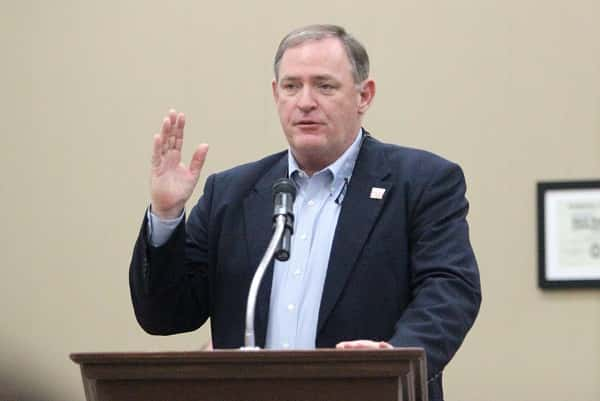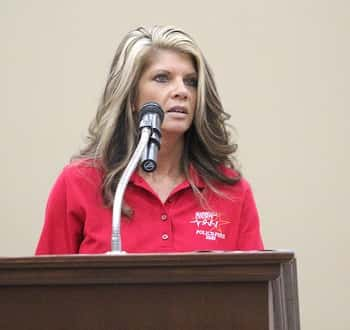
BENTON – In on-going efforts to come up with ways to fund the 911 center, not only here in Marshall County but across the state and nation with the rapid decline of taxable land lines, centers are suffering from under-funding. Marshall County has reached a point where it has become imperative to address the funding issue and find ways to fully fund the 911 center.
Dale Edmondson, Executive Director of Campbell County Dispatch Center, was invited by the Fiscal Court to speak about what their county did to fund the 911 center utilizing a service fee based on properties with occupied residences and businesses billed though property taxes which replaced the monthly land line fee, something they were allowed to do after winning a Kentucky Supreme Court case in 2013.
Edmondson is in his 43rd year in the public safety business, most of which as been with the fire service. Edmondson said it became quite clear to him that the 911 service could not be sustained on the rapidly declining land line fees. Edmondson’s opinion on raising the land line fees is the “worst possible thing to consider” and is very unfair.
Campbell County currently charges $45 per year for each occupied residence or business and Edmondson said the tax payers at large understood that the 911 service is necessary and needed to be funded and in many cases, was less than they were paying previously per land line monthly.
Currently, the Marshall County Fiscal Court subsidizes the E911 center at approximately $300,000 with an annual operational budget needed at around $600,000 currently.

Misti Drew, Marshall County E911 Director, gave a presentation to the court about their services, where they are today and funding issues they are having. Housed at the Sheriff’s Office in the Dispatch Center, they operate 365 days a year, 24 hours a day, seven days a week.
Drew talked about the many varied things their center covers, fielding 100,000 calls for service each year and dispatch over 60,000 dedicated responses from local agencies in 2016. Medical and Police emergencies are most common and in 2016 the number of Police calls for service was 47,214, EMS calls for service was 4,720, fire calls 2,044, other calls 5,076 and rescue calls 700 for a total CAD calls for service adding up to 63,889.
Drew said their dispatchers must be prepared for any type of emergency and are certified in Emergency Medical Dispatching through the Department for Criminal Justice, first aid and CPR, completion of a 200-hour course to earn certification in the state and in-service hours to maintain their certification.
Currently, the Marshall County 911 service is funded three different ways; local landline surcharge, CMRS Funding and Fiscal Court subsidy. A hardship was placed on 911 agencies dependent on landline revenue when Kentucky passed de-regulation in 2015 which dropped the requirement for phone companies to maintain local service in rural areas with the rapid decrease of landlines.
The cost of living increase has been substantial in all areas from stamps to groceries and according to Drew, if landlines had remained stable with the cost of living increase, the 911 budget would have increased as well, but the decrease in landlines and increase in wireless phones, fees do not cover the gap. Statistics from 2012 show 911 calls from landlines at 35% and from cell phones 65%.
In 2010, the Fiscal Court approved a $125,000 funding subsidy to 911 due to landline fee shortages and to keep the service within the county, since that time, the court subsidy has increased to $300,000 due to the need to replace an aging and outdated CAD system which is the hub of the 911 dispatch center.
In 1992, the 911 budget was $242,000 and in 2016, increased to $618,000. The call volume in 1992 was approximately 4,000 and has increased to over 100,000 in 2016.
Drew said issues pertaining to current funding do not sustain the center and funding through landline fees unfairly places responsibility on those who maintain landlines such as the elderly and local businesses. There is no room for growth with federal Next Generation 911 mandates, which according to 911.gov, “will enhance the 911 system to create a faster, more flexible, resilient, and scalable system that allows 911 to keep up with communication technology used by the public.”
The funding shortage also affects manpower shortages, turnover and facility upgrades. Drew said the subsidy from the Fiscal Court pulls away from other county projects.
Residential, business landline and residential customers currently pay a fee per month but under occupied residence and business fee based service, an annual fee would be charged. Raising landline fees on those who still maintain them would be an unfair burden on a declining population.
A parcel fee would eliminate the current subsidy from the Fiscal Court and would be applied to each ‘occupied individual residential unit’ and each ‘occupied individual commercial unit’ located upon each parcel of property.
The 911 dispatch center needs are a new CAD (Computer Aided Dispatch) system, radio system, Next-Gen digital phone system plus training expenses which could total over $800,000.
The issue for the Fiscal Court is identifying if the towns and community will buy in to the annual residential and business parcel fee. The court plans to schedule town hall meetings to educate the citizens of Marshall County on this issue.
Benton and Hardin mayors were present at the meeting, Calvert City was not represented and they were not a part of the previous 911 interlocal agreement. Sheriff Kevin Byars said collections of the fee, which will appear on the property tax bill, will not be a problem, citing the counties collection rate on property taxes runs 95 to 96 percent.
The next step for the Fiscal Court will be Town Hall meetings to inform the county citizens on the options to fund the 911 center.
Discussions among the commissioners went to the cooperation between the cities and county and how they felt about the management of 911 falling under the Sheriff’s Office. Commissioner Gold wants to make sure the city councils are on board and in agreement with the funding of 911.
The motion was made and approved for the Sheriff’s Office to be the authority over the 911 center as well as a motion made and approved to draft a document to move forward with the management and funding options for 911.